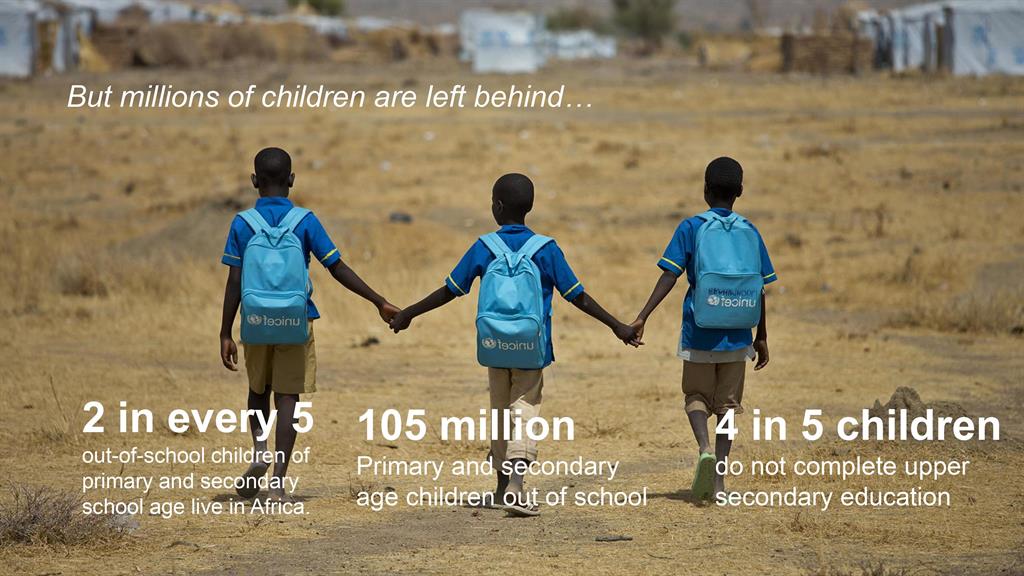Africa against the Global North
An estimated 4.3 million schoolchildren will drop out in Africa due to Covid-19.
According to research done by Unesco in partnership with Unicef, 4.3 million learners are estimated to drop out of school in 2021 because of domestic needs that are exacerbated by the Covid-19 pandemic on the African continent.
In a recent Webinar held by Unesco with some global partners, the chief of section of the education policy at Unesco, Gwang-Chol Chang, released the statistics under the theme off reimagining education in Africa. According to the statistics, the socio-economic impact of Covid-19 is more severe than the health impact of the Covid-19 pandemic.
With the statistics released more males are estimated to drop out of school than females. The data also shows that 66% of Africans do not have access to internet and 89% of learners do not have access to home computers.
During the pandemic an uneven spread of education stimulus packages has been seen. Higher income countries received 97% of education stimulus from the IMF.
According to further reports released by Unicef, three in every five people of African descent are below the age of 25. Which makes it more imperative to develop and support skills of learners in Africa.
The World Bank has estimated by 2030, 78% of children in the sub-Saharan countries will remain ‘learning poor’ if the state of education does not improve. ‘Learning poor’ refers to children under the age of nine or ten that cannot read a simple sentence.
The State of South African Education
During the Covid-19 pandemic South Africa experienced a high number of dropouts. According to the chief director of basic education in South Africa, Enoch Rabotopi, the technological disparities in the country became more apparent. The learning losses of children from different social classes were highlighted during the pandemic.
The ways in which the country tried combating learning losses were through trimming the curriculum to give learners and teachers more time to cover what they needed to. The mid-year examinations were moved to accommodate learners with the learning losses they encountered. The South African government appointed 300 000 young people to support teachers with their administration duties and technical difficulties while the teachers focused on catching up with the curriculum. Rabotopi further elaborated that the country was in contact with Namibia, Tanzania, Rwanda and Zimbabwe to share best practices in education.
In a recent Webinar held by Unesco with some global partners, the chief of section of the education policy at Unesco, Gwang-Chol Chang, released the statistics under the theme off reimagining education in Africa. According to the statistics, the socio-economic impact of Covid-19 is more severe than the health impact of the Covid-19 pandemic.
With the statistics released more males are estimated to drop out of school than females. The data also shows that 66% of Africans do not have access to internet and 89% of learners do not have access to home computers.
During the pandemic an uneven spread of education stimulus packages has been seen. Higher income countries received 97% of education stimulus from the IMF.
According to further reports released by Unicef, three in every five people of African descent are below the age of 25. Which makes it more imperative to develop and support skills of learners in Africa.
The World Bank has estimated by 2030, 78% of children in the sub-Saharan countries will remain ‘learning poor’ if the state of education does not improve. ‘Learning poor’ refers to children under the age of nine or ten that cannot read a simple sentence.
The State of South African Education
During the Covid-19 pandemic South Africa experienced a high number of dropouts. According to the chief director of basic education in South Africa, Enoch Rabotopi, the technological disparities in the country became more apparent. The learning losses of children from different social classes were highlighted during the pandemic.
The ways in which the country tried combating learning losses were through trimming the curriculum to give learners and teachers more time to cover what they needed to. The mid-year examinations were moved to accommodate learners with the learning losses they encountered. The South African government appointed 300 000 young people to support teachers with their administration duties and technical difficulties while the teachers focused on catching up with the curriculum. Rabotopi further elaborated that the country was in contact with Namibia, Tanzania, Rwanda and Zimbabwe to share best practices in education.




Kommentaar
Republikein
Geen kommentaar is op hierdie artikel gelaat nie